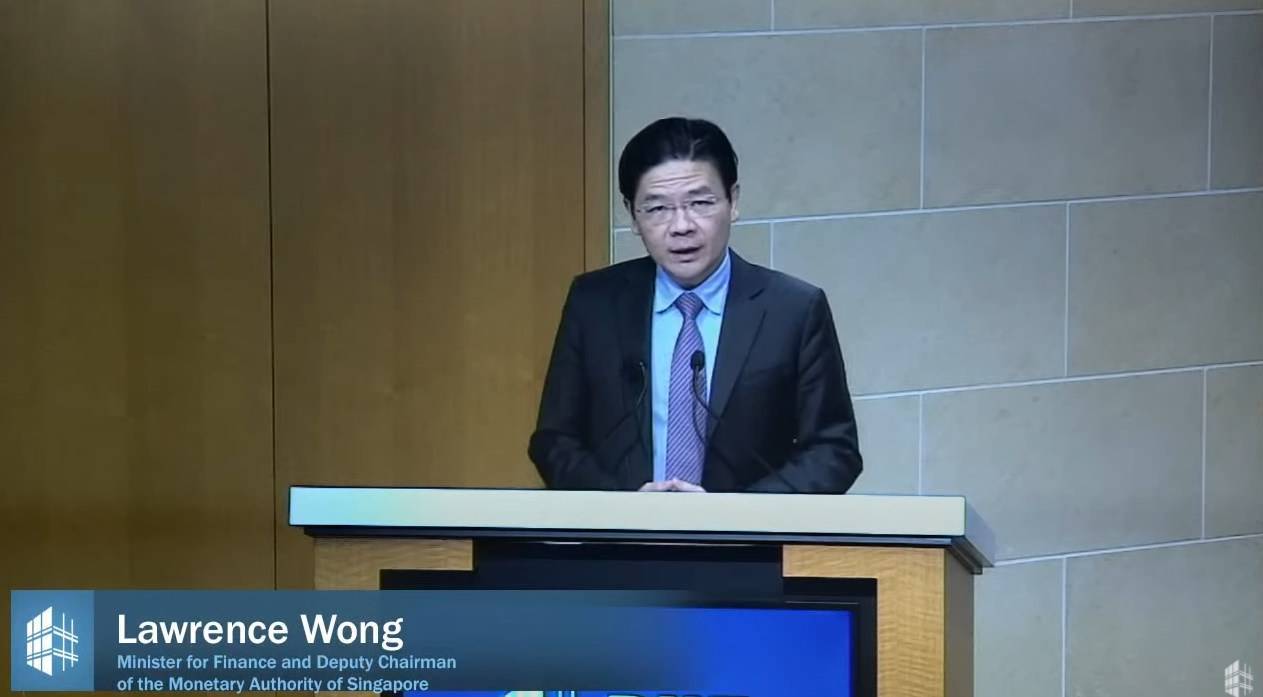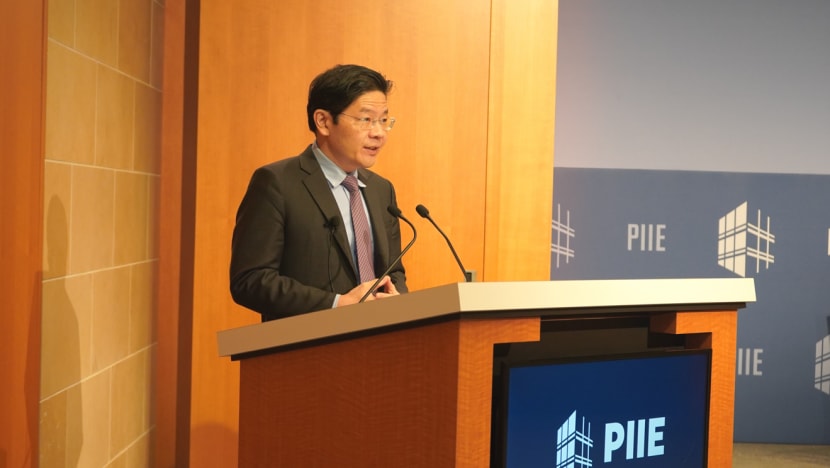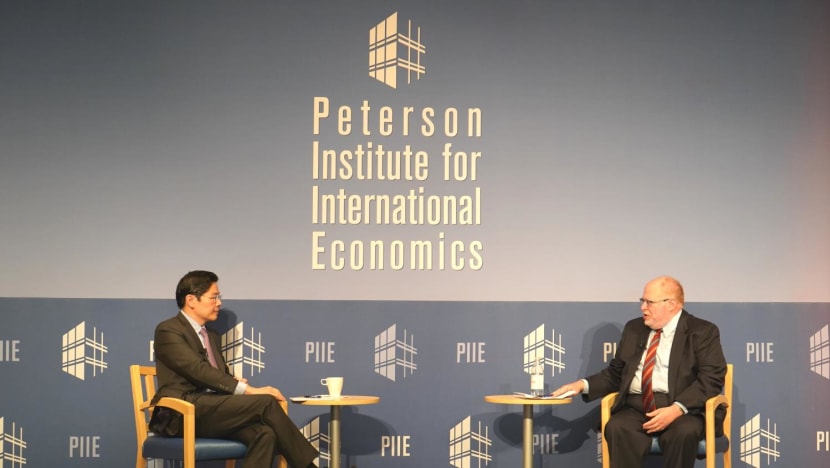李显龙“准接班人”黄循财在美发声:围堵只会让中国开发本土科技,自定国际规则
【文/观察者网 李焕宇】据新加坡《联合早报》4月19日报道,已确定将出任新加坡下一任总理的黄循财在他的首个出访行程中提出,将中国排除在现有国际体系之外,只会令中国发展出以自身规则为基础的一套平行体系。
本周一,新加坡财政部长黄循财开启了他被确立为第四代领导班子领军人后的首个出访行程——美国智库彼得森国际经济研究所(PIIE)2022年宏观周活动。他在致辞后的对话环节中提出,中国的增长趋势不可阻挡,尝试围堵中国崛起不仅十分困难也不会有效,而且只会让中国更下定决心自力更生,开发本土科技并自行设立另一套国际规则。
他重申,中美关系是世界上最重要的双边关系,各国都希望双方能继续交流,找出在共同关注的议题上合作的方法。

黄循财讲话现场 视频截图
黄循财称:“我不知道我们最终是不是要生活在这样的一个世界,这将是个非常不一样的世界,而且对于每个人包括美国来说,都是高度不稳定的......事实是,中国会有自身的发展,美国没有能力让中国变得更像美国,但就算彼此存在差异,美国和中国都有共同关注的议题,包括如气候变化等全球议题、应对大流行,甚至是核不扩散。”他相信,若能找出中美双方能继续竞争,却又能相互依存,在开放的框架里合作寻求互惠互利,整个世界都会更安全更美好。
黄循财还指出,如果当初美国没有退出,《跨太平洋伙伴关系协定》(TPP)得以延续固然很好,但如今已有《跨太平洋伙伴全面进展协定》(CPTPP),中国也提出了申请加入。该组织将通过适当的程序来处理中国的申请。除此之外,本区域内还有亚太经济合作组织(APEC)、东亚峰会(East Asia Summit),以及拜登政府最近提出的“印太经济框架”(Indo-Pacific Economic Framework),黄循财对此表示欢迎和支持。他说:“我们希望打造一个开放和包容的框架,让所有大国能参与亚洲和亚太的事务。”
除了中美议题,黄循财还对发达经济体的债务状况表示担忧。
近两年,为了应对新冠大流行所带来的经济冲击,世界多国政府绞尽脑汁扩大财政支出。但黄循财提醒,政府不可能一直扩大财政政策。在制定政策时,政府须确保公共支出是可持续的。
“不幸的是,许多发达经济体的记录并不乐观,债务一直上升……我不确定这能持续多久。这不是免费的午餐。最终必须有人为此付出代价。”
“大国有更多的自由度。美国拥有一个大陆规模的经济和全球储备货币,就比新加坡拥有更多的自由度,但仍然会有极限。在某个时间点,我认为各国将不得不找到方法来缩减支出,并确保能重建财政空间以应对未来的冲击。”
“不幸的是,许多发达经济体的记录并不乐观,债务一直上升……我不确定这能持续多久。这不是免费的午餐。最终必须有人为此付出代价。”
“大国有更多的自由度。美国拥有一个大陆规模的经济和全球储备货币,就比新加坡拥有更多的自由度,但仍然会有极限。在某个时间点,我认为各国将不得不找到方法来缩减支出,并确保能重建财政空间以应对未来的冲击。”
他婉转指出,当举债达到一个限度,任何政府都可能失去债务偿还能力的信誉。虽然目前市场对中央银行的公信力仍有一定信心,但这样的信誉是各个央行多年来确保通胀能保持稳定,所建立起来的,央行不应该视之为理所当然,特别是发达经济体的中央银行必须展示果断和决心,以解决目前通胀持续升温的问题。

黄循财讲话现场 图片来源:联合早报
黄循财还称,各国必须重新定义财政政策,更新社会契约。为应对全球经济面临的增长、包容和可持续发展三大结构性挑战,国家与政府财政支出功能必须重新定位到为社会提供公共产品和建设长期集体能力上。
他说,各国之间和各国国内的贫富差距情况正在加剧。多数国家的代际流动性也减弱,社会阶层越来越固化。疲弱和不平均的收入增长、高度的不平等和社会流动性的缺乏都造成严重风险。
“人们如果认为自己成功的概率不大,无论怎么努力都无法跻身社会上层,下一代不会过得更好,社会稳定将受到影响,一切就会开始分崩瓦解。”
“人们如果认为自己成功的概率不大,无论怎么努力都无法跻身社会上层,下一代不会过得更好,社会稳定将受到影响,一切就会开始分崩瓦解。”
在黄循财看来,各国必须在解决急迫问题和打造共同能力支撑长远发展之间找到正确的平衡。国家应发挥更积极、有意义的角色,以达到重要的长期目标,包括提高生产力、应对不平等、重新启动社会流动性,及催化绿色经济。
黄循财是现任新加坡财政部长。4月14日,他财获得内阁成员绝大多数的支持,正式推举为第四代团队领导。16日,新加坡总理李显龙在总统府召开发布会时宣布,下一次大选将最迟在2025年11月举行,届时如果执政党人民行动党再次赢得大选,就由黄循财担任总理。
新加坡财政部长:国家无止境举债终会付出代价
新加坡财政部长黄循财于美国时间18日在彼得森国际经济研究所(PIIE)举办的2022年宏观周上指出,各国在制定财政政策时须确保可持续的公共支出,尤其不可无止境地举债。“不幸的是”许多发达经济体的记录并不乐观,债务一直上升,最终总得有人付出代价。他呼吁货币政策和财政政策都应为应对增长与滞胀问题发挥作用。
黄循财说,近两年,为了应付新冠疫情带来的经济冲击,多国政府扩大财政支出。加上近期俄乌局势紧张,全球正面对通货膨胀、增长放缓,甚至停滞性通胀的威胁。在财政方面,政府可以采取更宽松的政策,以应付可能对实体经济的影响,并确保通胀预期得到良好控制。但黄循财也提醒,政府不可能一直扩大财政政策。在制定政策时,政府须确保公共支出是可持续的:“不幸的是,许多发达经济体的记录并不乐观,债务一直上升……我不确定这能持续多久。这不是免费的午餐。最终必须有人为此付出代价。”
黄循财也婉转指出,当举债达到一个限度,任何政府都可能失去债务偿还能力的信誉。
黄循财提醒,在货币政策方面,目前市场对各国中央银行的公信力仍有一定的信心,而这样的信誉是各个央行多年来确保通胀能保持稳定,所建立起来的。但央行不应该视之为理所当然,特别是发达经济体的中央银行必须展示果断和决心,以解决目前通胀持续升温的问题。
谈到亚太经济体时,黄循财说他不认为国际主要央行为了应付通胀而加息,可能导致新兴市场资金流出。他表示包括东南亚在内的亚太地区许多经济体如今的基本面更稳健,更有能力应付加息的影响。
Macro Week 2022: Lawrence Wong Speech
https://www.youtube.com/watch?v=YZHQ-eG7pUU&t=416s
2,689次观看 上次直播时间:21小时前
Peterson Institute for International Economics
At this critical juncture for the global economy and monetary policy, the Peterson Institute for International Economics is convening central bankers and finance officials from around the world for our annual Macro Week—a series of speeches and onstage discussions moderated by PIIE President Adam S. Posen. Lawrence Wong (Minister for Finance, Singapore) speaks on April 18, 2022. For more information, visit: https://www.piie.com/events/macro-wee...
World faces sharper trade-off between growth and inflation: Lawrence Wong
 Minister for Finance Lawrence Wong at the Peterson Institute for International Economics Macro Week 2022 on Monday, Apr 18, 2022. (Photo: Ministry of Finance)
Minister for Finance Lawrence Wong at the Peterson Institute for International Economics Macro Week 2022 on Monday, Apr 18, 2022. (Photo: Ministry of Finance)
SINGAPORE: The world faces a sharper trade-off between growth and inflation given how it is “almost a certainty” that inflation will be higher for longer, said Finance Minister Lawrence Wong on Monday (Apr 18).
Many countries around the world were already grappling with the issue of lacklustre growth before the COVID-19 pandemic. But the virus outbreak and the war in Ukraine have since brought on another challenge of higher inflation.
Global growth is also threatened by the effect of domestic macroeconomic policies in some major economies.
“In short, the risks for both growth and inflation are weighed significantly on the downside,” Mr Wong said, noting that this complicates an already extremely difficult task of balancing growth and inflation for central banks, particularly those in the advanced world.
It remains to be seen whether central banks can successfully guide their economies to a soft landing, he added.
Compounding these growth challenges is a “more fundamental and worrying shift” in the global economy – the ebbing tide of globalisation. While he does not expect a reversal of globalisation, Mr Wong cautioned that the world “could be heading into a new era of decoupled globalisation”.
“The hope for some decades has been that trade could tamp down geopolitical rivalry but we are now seeing another logic at play, with geopolitics having the potential to undermine trade instead,” he said.
“It is too early to tell what decoupled globalisation will look like, but we must be prepared for a more divided world economically that will mirror a more divided world politically.”
This will have an impact on global growth, with the poorest and most vulnerable countries likely being hit the hardest. This will in turn make it more difficult for developing countries to converge with the advanced world, he said.
Mr Wong was laying out the threats that governments and societies today face when it comes to growth in a keynote speech delivered at the Peterson Institute for International Economics’ (PIIE) Macro Week in Washington DC. The annual event features a series of speeches and discussions by finance ministers and central bankers from around the world.
In his near 30-minute speech, the Finance Minister, who is on a visit to the United States, also highlighted two other structural challenges faced by the world – inclusion and sustainability.
On the former, Mr Wong noted that there is a growing divide between the richest and poorest both across and within nations, partly due to rapid technological advances.
Inclusive growth has also been made more difficult by the pandemic, with unskilled workers and women having suffered disproportionately. He also pointed out how in Southeast Asia alone, the pandemic has pushed nearly five million more people into extreme poverty.
“The consequence of these factors – weak and uneven income growth, high inequality, and weak social mobility – pose significant risks for us all,” said Mr Wong.
"When people feel that the odds are stacked against them, when they cannot reach the top no matter how hard they try, when their children will never do better than them, social stability is affected and things start to fall apart."
On sustainability, the need for meaningful action on climate change has grown as global warming continues apace, he said.
But with so much attention being focused on the war in Ukraine and the COVID-19 pandemic, the latest “sobering” report issued by the United Nations’ Intergovernmental Panel on Climate Change (IPCC) on the increasing severity of climate change did not attract headlines the way it should have, said Mr Wong.
Given the Ukraine conflict, reliance on fossil fuels is expected to increase even further in the short term.
“This may be necessary to cope with the short-term energy shortages and to keep the lights on, but it also means that we must redouble our efforts in the medium and longer-term, to set the right price for carbon, regulate emissions and invest in cleaner, low-carbon technologies,” he added.
“NO EASY ANSWERS”
There are “no easy answers” when it comes to responding to these challenges, Mr Wong said.
He noted that while expansionary monetary policy has succeeded in buffering economies and financial systems against severe shocks for more than a decade, it has had its downsides and has likely reached its limits.
“As the balance of macro-risks shift towards inflation, the era of easy money will come to an end. Fiscal policy therefore has to play a more important role,” he said.
Part of this is about being able to respond quickly with immediate stimulus when needed, Mr Wong added, noting that many countries have done so over the past two years to stave off the most severe downsides of COVID-19 and mitigate longer-term economic scarring.
But such extraordinary levels of spending will be hard to sustain over extended durations. With interest rates rising, there will be a need to taper spending or raise revenues to ensure more sustainable government budgets over time and to gradually rebuild fiscal space to deal with future shocks.
More crucially, Mr Wong noted that the issue “is not just about the amount of spending, but how and what we spend on”.
“We need to re-purpose fiscal policy and renew the social contract,” he said.
“This is not a call for bigger government per se. Rather it’s about the state playing a more active and purposeful role to achieve important longer-term goals – to raise productivity, to tackle inequality and rekindle social mobility, and to catalyse the green economy.”
With that, Mr Wong gave three suggestions on how the world can drive inclusive and sustainable growth.
The first is to re-purpose fiscal policy and the role of the state towards building public goods and longer-term collective capacity. These include spending to rejuvenate and expand critical infrastructure, investing in early child development, as well as healthcare.
Such investments by the state and designing the right incentives, whether in eldercare, healthcare, early childhood development or infrastructure, are the bedrock for building inclusive and sustainable growth, said the Finance Minister.
Mr Wong’s second suggestion is to foster a “refreshed common agenda” between the public and private sectors, given that it will not be possible for governments to fund investments or to resolve many of today’s complex challenges alone.
This will involve going beyond traditional models of public-private partnerships for specific projects so as to forge “wider, deeper and longer-term collaboration between the government and industry, and work towards shared goals that advance the broader interests of society”.
One such area that requires stronger public-private partnerships is continuing education and lifelong learning. Mr Wong said that this is a key priority in Singapore and steps taken include the Government setting up individual SkillsFuture learning accounts for all, with periodic top-ups by the Government.
On the other hand, authorities have been working with employers and training institutes to design training programmes that are relevant to the industry.
Mr Wong’s third suggestion is to reinvigorate the open and rules-based international order, with stronger commitments to multilateral solutions.
“Today, the world seems more divided than ever before. The future has never seemed more uncertain. But amidst our differences, we must find enough common ground with each other to solve our collective problems,” he said.

Minister for Finance Lawrence Wong at the Peterson Institute for International Economics Macro Week 2022 on Apr 18, 2022. (Photo: Ministry of Finance)
Later, in a question-and-answer segment moderated by PIIE president Adam Posen, Mr Wong was asked about the sanctions imposed on Russia by various countries, including Singapore, and what that means moving forward.
In his reply, the minister said the “unprecedented nature of the scale and strength” of the sanctions in this instance showed an “effective response” to the Russian invasion.
“But we do ask ourselves and all of us have to ask ourselves, how should we think about applying similar sanctions in the future?”
From Singapore’s point of view, applying such extensive sanctions will require a “high threshold”, ideally a United Nations Security Council resolution. But this is “not always forthcoming”, said Mr Wong.
In this instance, Russia, which is a permanent member of the UN Security Council, vetoed the council’s draft resolution in February.
“If you’re not able to get the United Nations resolution, then at least consider the criteria and the basis in which such sanctions should be applied,” Mr Wong said, citing “important” considerations for Singapore such as clear violations of the United Nations Charter and when the fundamental principles of territorial integrity, sovereignty and independence are at stake.
“These are fundamental principles and therefore, you could consider making a case for applying such sanctions,” he added.
“After all, if crazy decisions and historical errors are the basis for invading another country, all of us everywhere in the world will feel very insecure. So I think if we set the right conditions, we will have a stronger basis for applying sanctions in future,” Mr Wong said.
“In fact, you may even get more countries coming on board because countries everywhere would be able to support such core principles, rather than drawing lines between democracies versus autocracies or authoritarian states, or saying ‘Join me because we are a group of like-minded allies’.”
Mr Wong is on a 10-day visit to the US until Apr 25 – his first overseas trip since he was announced as leader of the fourth generation of Singapore’s political leadership.
Apart from his speech at PIIE's event, Mr Wong will be in Washington DC and New York to meet members of the US Administration. He will also attend the World Bank-IMF Spring Meetings as well as the Second Finance Ministers and Central Bank Governors Meeting under the 2022 G20 Indonesian Presidency.
Accompanied by officials from the Ministry of Finance and the Ministry of Home Affairs, Mr Wong will also take the opportunity to meet private sector business leaders and Singaporeans based in New York.
m



